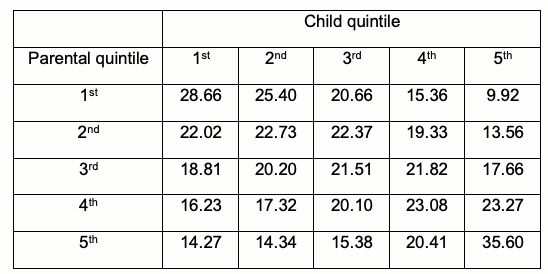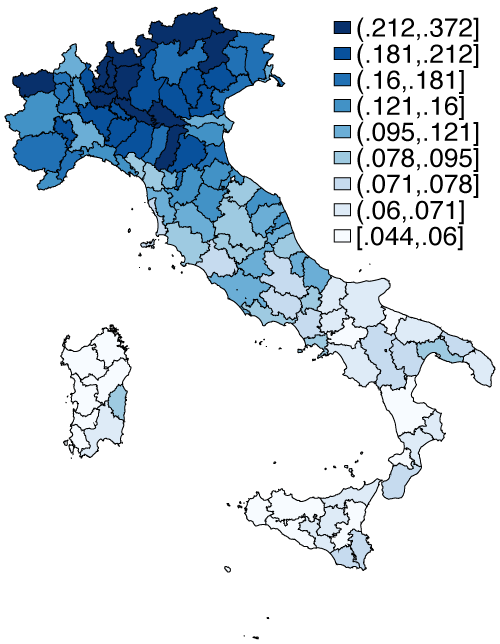Showing posts with label Inclusive Growth. Show all posts
Tuesday, July 30, 2019
Residential Mobility and Unemployment in the UK
In the context of Brexit and the developments within UK, this interesting paper by Monica Langella and Alan Manning gives a perspective on the labor market in the UK:
“One of the main forces that economists expect to equalize economic opportunity across areas is migration: individuals leaving depressed areas for booming areas. There is strong evidencethat migration does respond to differences in economic opportunity (for a thorough, though early, survey see Greenwood, 1997). The classic reference for the US is Blanchard and Katz (1992) who concluded that negative local labour demand shocks cause a short-run rise in the unemployment rate but that migration causes unemployment rates to be equalized within 5-7 years, a relatively short time. However, Amior and Manning (2018) argue that for the US the migration response over decades is slower than that estimated by Blanchard and Katz (1992) and that local demand shocks are highly persistent, causing very persistent differentials in unemployment rates. The US has also had a marked fall in residential mobility in recent years that has attracted attention (Molloy, Smith and Wozniak, 2011, 2014; Dao, Furceri, and Loungani, 2017). Similar exercises for Europe (e.g. Pissarides and McMaster, 1990; Decressin and Fatas, 1995; Overman , 2002; OECD 2005) find slower adjustment processes than in the US though Amior and Manning (2019) argue that the net migration response to unemployment in the UK is higher and more similar to the US than commonly believed. Although these studies do provide convincing evidence that migration does respond to economic opportunities, there is still surprisingly little evidence on the process in recent years (the survey of Greenwood, 1997, seems to be the most recent) and considerable gaps in our knowledge“
In the context of Brexit and the developments within UK, this interesting paper by Monica Langella and Alan Manning gives a perspective on the labor market in the UK:
“One of the main forces that economists expect to equalize economic opportunity across areas is migration: individuals leaving depressed areas for booming areas. There is strong evidencethat migration does respond to differences in economic opportunity (for a thorough,
Posted by at 10:25 AM
Labels: Inclusive Growth
Wednesday, July 24, 2019
Okun’s Law–Sectoral and Cross Country Differences
In a new paper, authors Eiji Goto and Constantin Burgi analyze the Okun’s law through sectoral and cross-country differences. The specific value add to existing research, according to the authors, is as follows:
“We contribute to the literature on cyclical differences by determining which category the Okun’s coefficient falls in. Specifically, we test whether the aggregate differences disappear if the sector sizes are the same across countries (e.g. if manufacturing has the same share of GDP for all countries) and we find that this can be rejected. We also examine whether all of the sectoral coefficients are proportional and we find that we cannot reject this. Next, we inspect whether any sector’s coefficient is the same as the aggregate’s and we find that this can also be rejected. Lastly, we decompose the Okun’s coefficient to determine whether the correlation between unemployment or the standard deviations of unemployment or GDP are driving the differences. We find that the standard deviation of unemployment is the main driver”
In a new paper, authors Eiji Goto and Constantin Burgi analyze the Okun’s law through sectoral and cross-country differences. The specific value add to existing research, according to the authors, is as follows:
“We contribute to the literature on cyclical differences by determining which category the Okun’s coefficient falls in. Specifically, we test whether the aggregate differences disappear if the sector sizes are the same across countries (e.g. if manufacturing has the same share of GDP for all countries) and we find that this can be rejected.
Posted by at 3:57 PM
Labels: Inclusive Growth
Tuesday, July 23, 2019
Costs of Recessions
From Stumbling and Mumbling:
“The Resolution Foundation’s James Smith has written a nice paper on the likelihood of recession and the fact that, with monetary less able to support the economy, we need to think about alternative ways of tackling recessions. I just want to amplify what he says in two ways.
First, there’s increasing evidence that recessions can do long-term damage, even if the economy appears to bounce back in the short-term. There are at least three mechanisms here:
– Education. Bryan Stuart shows that the 1980-82 recession in the US “generated sizable long-run reductions in education and income.” Parents who suffer a drop in income spend less on children’s books and educational trips, and this makes them less likely to go to college a few years later. Such effects are magnified if bad macro policy causes restraints upon public spending on schools and libraries.
– Productivity. Recessions increase uncertainty, which depresses investment in both capital and R&D, leading to lower productivity growth. The Bank of England’s Dario Bonciani and Joonseok Jason Oh say:
Shocks increasing macroeconomic uncertainty can lead to very persistent negative effects on economic activity that last well beyond the business cycle frequency.
– Scarring. A recent paper by Erin McGuire shows that people who grow up in hard times “invest less in risky assets throughout their lives, invest more in property, and are less likely to be self-employed.” This corroborates research (pdf) by Ulrike Malmendier and Stefan Nagel. Through this channel, recessions can reduce entrepreneurship and increase the cost of capital even decades later.
Against all this, it is theoretically possible that recessions have a beneficial “cleansing” (pdf) effect: in driving inefficient firms out of business, they make it easier for more efficient ones to expand, and this raises productivity growth.”
Continue reading here.
From Stumbling and Mumbling:
“The Resolution Foundation’s James Smith has written a nice paper on the likelihood of recession and the fact that, with monetary less able to support the economy, we need to think about alternative ways of tackling recessions. I just want to amplify what he says in two ways.
First, there’s increasing evidence that recessions can do long-term damage, even if the economy appears to bounce back in the short-term.
Posted by at 11:16 AM
Labels: Inclusive Growth
Friday, July 19, 2019
Intergenerational mobility in Italy: Income distribution and regional analysis
An interesting new piece in VoxEu by Paolo Acciari, Alberto Polo and Gianluca Violante on inter-generational mobility in Italy:
“In a new paper (Acciari et al. 2019), we add to this recent wave of studies and introduce a new dataset that allows us to develop the first systematic investigation of intergenerational income mobility for the Italian economy. Our starting point is the administrative electronic database on individual tax returns maintained by the Italian Ministry of Economy and Finance. From this data source, we extracted a sample of two cohorts of Italians born between 1942-1963 and 1972-1983. We matched parents and children through their social security numbers. Our final dataset contains nearly 650,000 parent–child pairs with detailed income information for three years in each cohort.”
Table 1 National quintile transition matrix (%)

“We follow up on this last finding by exploring the geographical differences in inter-generational upward mobility across the 110 Italian provinces. We document a staggering amount of variation, with a steep south-north gradient, as depicted in Figure 2. Relative to the south of Italy, provinces in the north (especially the regions in the northeast), are both more egalitarian – i.e. they display higher relative mobility – and more upward-mobile – i.e. they display higher absolute mobility. In the north, children from parents with unequal background are more similar in their economic outcomes when adults, and children from poor parents fare better when adults. The level of upward mobility in northern Italy exceeds that of Scandinavian countries”

Figure 2: Estimated transition probability from bottom to top 20% of income distribution across provinces
An interesting new piece in VoxEu by Paolo Acciari, Alberto Polo and Gianluca Violante on inter-generational mobility in Italy:
“In a new paper (Acciari et al. 2019), we add to this recent wave of studies and introduce a new dataset that allows us to develop the first systematic investigation of intergenerational income mobility for the Italian economy. Our starting point is the administrative electronic database on individual tax returns maintained by the Italian Ministry of Economy and Finance.
Posted by at 10:33 AM
Labels: Inclusive Growth
Sunday, July 14, 2019
Explaining High Unemployment in ECCU Countries
A new IMF paper explains unemployment in ECCU countries:
“Unemployment rates in Grenada (GRD), St. Lucia (LCA), and St. Vincent and Grenadines (VCT) have been above 20 percent in recent years. Unemployment in Dominica (DMA) has also been high by international standards even before the natural disasters that recently hit the country. While it is likely that weak employment this decade was partly related to the impact of the global economic downturn, unemployment was already high prior to the global crisis in most of these countries, thus suggesting there are structural factors behind it. This paper evaluates factors that could explain high unemployment in ECCU countries, cyclical and structural.1 Our analysis systemically reviews demand, supply, and institutional factors that could foster unemployment. Within this framework, we analyze the potential impact of the global financial crisis, the downfall of the banana/sugar industries, the hurricanes that frequently hit these countries, the relatively rigid wage setting process, as well as factors that could increase reservation wages.”
A new IMF paper explains unemployment in ECCU countries:
“Unemployment rates in Grenada (GRD), St. Lucia (LCA), and St. Vincent and Grenadines (VCT) have been above 20 percent in recent years. Unemployment in Dominica (DMA) has also been high by international standards even before the natural disasters that recently hit the country. While it is likely that weak employment this decade was partly related to the impact of the global economic downturn,
Posted by at 4:36 PM
Labels: Inclusive Growth
Subscribe to: Posts